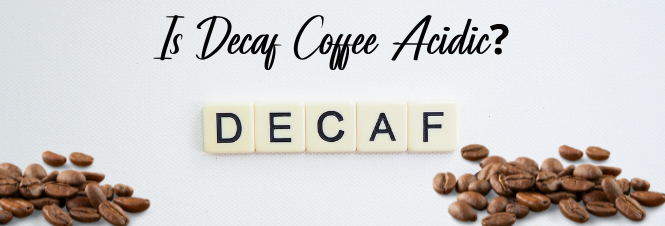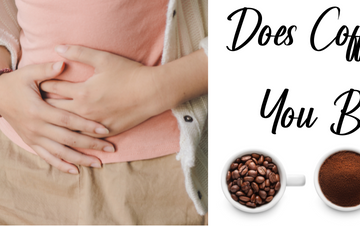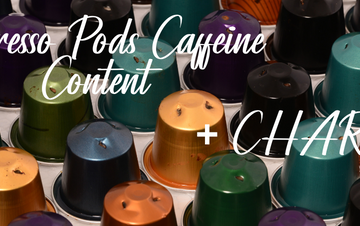Is Decaf Coffee Acidic?

Is decaf coffee acidic? The answer is yes. Decaf is acidic. However, you might find it’s not as bad as you thought.
Nowadays, the trend is to be vegan, keto, or, if I may summarize, to have a healthy life. Although this is a good factor, it can be troubling for coffee drinkers.
It’s well-known that decaf coffee is a better choice for those who want to stay clear of excessive concentrations of coffee. But what about acid? Yes, coffees have been recognized to trigger issues in our stomachs and possibly even our teeth. However, do you think decaf is the best option for those who suffer from these ailments?
Let`s find out.
TABLE OF CONTENT:
- What Is Acid in Coffee?
- Is Decaf Coffee Acidic?
- Is Decaf Coffee Bad for Acid Reflux?
- Why Change from Regular Coffee to Decaf?
- Is Decaf Coffee Less Acidic than Regular Coffee?
What Is Acid in Coffee?
You might be thinking about what I mean by acidic coffee. Similar to other food items and drinks, coffee is a source of many organic acids. There are 22 acids in ground roast coffees. Some of them are citric acid, acetic acid, molecular weight acids, chlorogenic acids, formic acid, quinic acid, malic acid, and phosphoric acid. The interesting fact is that the amount of chlorogenic acids (CGA) depends on the roast level rather than the coffee type. But the CGAs have antioxidants as well.
So, when people speak of acidic coffee, they’re referring to the particular tastes the acids impart to coffee beans. Of course, citric acid, which is mainly akin to oranges, provides your coffee with an aroma of citrus. Malic acid tastes sweet and tartaric is similar to wine. If you drink too much acetic acid, the coffee you drink will smell like vinegar.
Is Decaf Coffee Acidic?
Decaf coffee can be acidic but research has shown that it is not as acidic as regular coffee. Particularly, it was discovered that the caffeine extraction process reduced the levels of phenolic acid were decreased.
Is Decaf Coffee Bad for Acid Reflux?
Decaf coffee is known to help reduce acid reflux (GERD). This doesn’t mean that decaf coffee won’t upset the stomach or other issues that acidic coffee can trigger. Decaf coffee could help prevent heartburn and other signs of acid reflux.
Gastroesophageal reflux disease, also known as acid reflux, leads to stomach problems. The main observed symptom is the leakage of gastric contents from the stomach to the esophagus.
A lot of coffee drinkers inform having stomach issues. This isn’t atypical and is one of the significant reasons that they have been reluctant to give up their favorite beverage in the past.
The acid that affects the digestive tract is called quinic. If the coffee contains small amounts, it provides a smooth finish and a pleasing taste. When it is excessive, it triggers acid reflux and upsets the stomach. Dark roast coffees or those that are left in the pot are typically the main culprits for excessive concentrations of quinic acids.
Other effects of drinking coffee are connected with the Lower Esophageal sphincter. After you swallow food or drink, the lower esophageal sphincter (LES) should stop stomach contents from flowing up into the gullet.
The drop in LES pressure triggered results in acid reflux and heartburn. Especially for those who suffer from gastroesophageal reflux disease.
The reduction of LES pressure and consequent aggravation of heartburn symptoms can be observed after consuming neutral (pH=7) and acidic (pH=4.5) coffee.
The acidic component of coffee isn’t the sole reason for the deterioration of your GERD symptoms.
There’s evidence that decaffeinated coffee does not negatively impact LES function, as opposed to regular coffee.
All of this could signify that caffeine is the culprit for heartburn or acid reflux after drinking coffee.
Decaf could be an ideal option to replace regular coffee.
Is Cold Brew with less Acid?
If you’re concerned about the impact of acidity in the coffee you drink, you can stay clear of it and still enjoy the flavor. You just have to change to cold brew coffee.
Cold-brew coffee might not be the most popular choice for all coffee drinkers. However, its preparation method reduces acid levels in the beans. If the coffee beans are immersed in water up to 25 hours before use, certain substances cannot dissolve. This helps to have a less acidic cup of coffee.
To get a more balanced taste, try combining this technique with decaf coffee, and you might have a winning combination in your pocket. It’s hard not to be amazed by the advantages of this beverage.
Why Change from Regular Coffee to Decaf?
Decaf coffee is a good choice for you because of its health benefits. Due to the decaffeination process, its antioxidant and phenolic content capacity is somewhat lower than caffeinated beans. But it is still a great source of powerful antioxidant properties.
Another of its benefits is a lower risk of developing diabetes.
The evidence exists proof that, just like traditional coffee, Decaf could help reduce cognitive and motor impairments as we age.
While it’s not going to improve cognitive function like traditional coffee, decaf coffee also has neuroprotective characteristics similar to regular coffee.
In addition, consuming a lot of caffeine is typically connected with increased anxiety levels.
Increased levels of anxiety are linked to increased heartburn and the severity of retrosternal pain.
This is yet another reason why Decaf coffee may be more beneficial than regular coffee for people who are often afflicted by acid reflux.
Is Decaf Coffee Less Acidic than Regular Coffee?
Analyzing the acidity in your morning coffee could be very beneficial if you suffer from GERD.
Based on this systematic study, around 20 percent of the US population suffers from GERD.
GERD symptoms can be aggravated when consuming acidic drinks and foods like citrus fruit juices.
Many people who wish to stay clear of acid reflux search for ways to lower acidity in coffee.
Naturally, some are interested in finding out if decaf coffee can cause acid reflux.
Decaf coffee is typically lower in acidity than regular coffee since it loses a portion of its acidic phenolic compounds during the decaffeination process.
The pH of the former is in the same manner as the values of regular coffee. However, pH is not a good indicator of the complicated chemistry of extracts of coffee.
Additionally, decaf coffee doesn’t cause acid reflux or heartburn as often as regular coffee.
This could be because decaf coffee can have the majority of its caffeine removed, and caffeine is linked to an increase in the risk of acid reflux.
Decaffeinated coffee might be beneficial for people with GERD.
People Also Ask
How Do You Make Coffee Less Acidic?
The addition of milk can make coffee acidic a tiny bit less. Dairy protein often neutralizes some acids in coffee, while other flavors soften because of the calcium content of milk. A medium-sized cup of dark roast coffee is typically less acidic, and milk is a highly-loved medium-sized cup of dark roast coffee.
What Type Of Coffee Is Less Acidic?
Regarding acidity In terms of acidity, dark roasts are more acidic than medium and light roasts. Because the roast is baked for longer and is acidic, it is the most roasted type of roast. Many acids are lost in roasting, and the longer roasting continues, the less acidic it gets.







